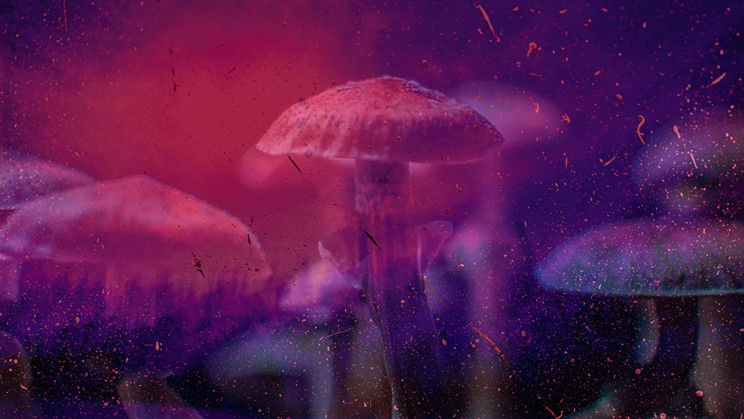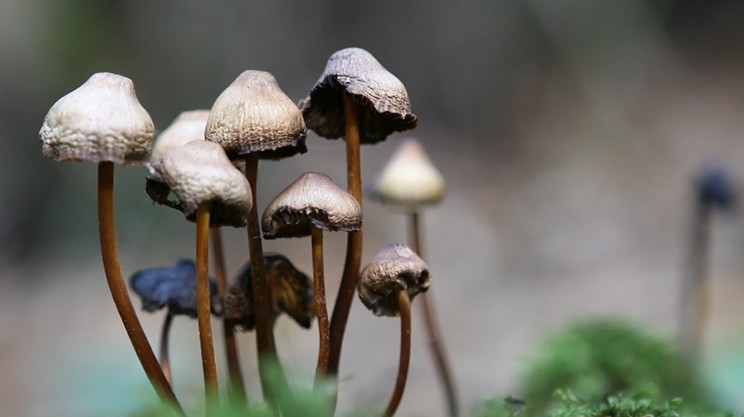The glitzy hotel conference room surroundings said as much about psychedelics’ rise to mainstream interest as anything else. In the basement of the Atlantica Hotel in mid-November, a group of 30-odd academics, therapists, mycologists and MBAs mingled to discuss the latest research and commercial forays into magic mushrooms, MDMA and other psychedelic tools of therapeutic treatment.
On their minds: How to tap into an industry projected to be worth US$8.3 billion worldwide by 2028. It’s a realm Nova Scotia, by and large, has yet to enter. But that’s changing.
Last week, Nova Scotia’s first-ever clinical trial involving psilocybin—the psychoactive ingredient in magic mushrooms—began treating its first volunteer patients. The Windsor-based Halucenex Life Sciences Inc. is trialling the compound for use in treating severe post-traumatic stress.
The pharma startup isn’t the first in Canada to bet on psychedelics (a realm of drugs loosely grouped for their mind-altering effects) for their therapeutic potential. As far back as the 1950s, psychiatrists in Saskatchewan and BC were exploring LSD’s potential as a treatment for alcoholism, anxiety and depression. The Halifax-based Novaket (6088 Quinpool Road) has offered intravenous ketamine treatments for patients with treatment-resistant depression and PTSD since 2019. Across the Nova Scotia-New Brunswick border, the Toronto-based Field Trip Health opened its first Atlantic Canada ketamine clinic in Fredericton in October 2021. In January, Health Canada restored its “special access program,” granting physicians the green light to request restricted psychedelics for patients on a “case-by-case basis.”
But as Nova Scotia and Canada wade into what’s been heralded as a “psychedelic renaissance,” some are preaching caution: How conclusive is the research? How much of the current boosterism is about money-making instead of medicine? What kind of safeguards should apply for treatment and who can provide it? And does this newest wave of interest risk becoming another form of colonialism?
Research “changing the conversation”
Ask Erika Dyck, a Dalhousie alum and one of Canada’s foremost scholars on the country’s history of psychedelic research, and she’ll tell you there’s good reason for the recent groundswell of psychedelic enthusiasm. Universities and hospitals across Canada—from Acadia to Queen’s to Calgary—have launched research units into the potential therapeutic uses of MDMA, ketamine and psilocybin. The results, in many cases, have been striking.
Researchers at Toronto’s University Health Network gave ketamine to 209 adults with treatment-resistant depression and found it led to a “significant reduction” in their anxiety levels and any suicidal ideation. Scientists at UBC Okanagan found adults who microdose psychedelics (that is, consume them in small enough quantities that they don’t get high) reported lower levels of anxiety and depression than their straight-edged peers.
“I think it’s really changing the conversation,” Dyck says, speaking by phone with The Coast.
The main appeal of psychedelics, though, is that our current pharmaceutical options kinda suck. The most commonly-prescribed antidepressants (known as SSRIs, which work by flooding the brain with mood-boosting serotonin), work for about 40 to 60% of people who take them. They can also lead to headaches, diarrhea, dizziness and difficulty achieving orgasm.
Even for those who find SSRIs and their equivalents useful, it tends to take four to six weeks for the drugs to have any effect—which, for someone struggling with their mental health, can feel like an eternity. And those drugs require a regimen that can last years, if not decades. Ketamine, on the other hand, has been found to yield results within hours. Studies with psilocybin have found results after a single session.
Suffice it to say, any change in either drug’s legal status in Canada would mean big business—and that extends to Nova Scotia. (Psilocybin is considered a Schedule III substance and comes with a three-year prison sentence, if convicted of possession. Ketamine is considered illegal “unless authorized for medical, scientific or industrial purposes.”) Ottawa is already shelling out cash for psychedelic research: In May of this year, the Canadian Institutes of Health Research launched a $3-million grant for trials exploring the “safety and early efficacy” of using magic mushrooms in conjunction with therapy to treat substance use and mental health concerns.
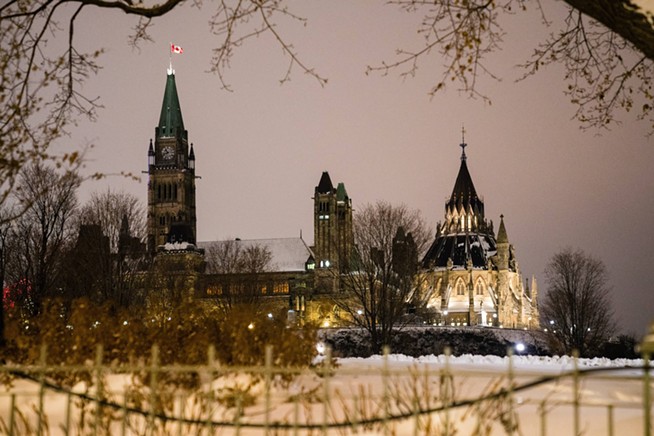
Investors in Nova Scotia and beyond are taking notice: Last year alone, the Berlin-based Atai Life Sciences debuted on the US stock market with a total value of $3.19 billion.
But who stands to benefit most?
The business of psychedelic-assisted therapy
You can count Halucenex’s president and CEO, Bill Fleming, as among those bullish on psychedelics’ potential in our province. He also represents one of the groups most interested in psychedelics’ legal future: Entrepreneurs.
“I’m not a physician,” he stressed to those gathered at the Psychedelica Atlantica conference in Halifax on Nov. 15. “I’m a finance guy who looks for opportunities.”
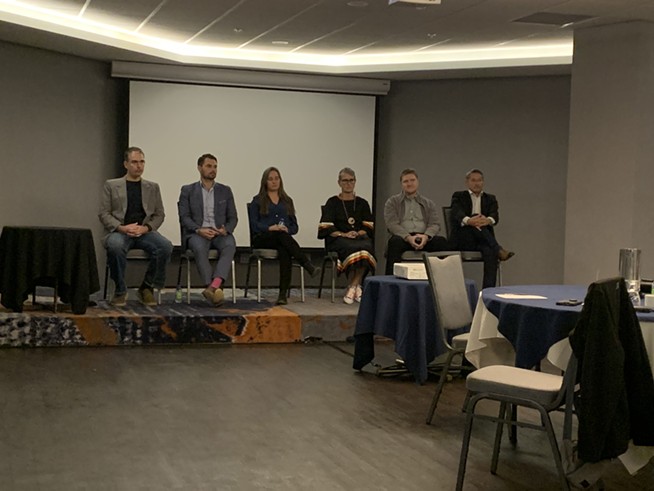
Before Halucenex, Fleming spent his time in resource extraction, cannabis and renewable energy. He’s still the executive chairman of Mountain Lake Minerals, a Windsor-based mining company with gold and lithium projects in Newfoundland.
Fleming sees vast opportunity in psilocybin’s potential for treating PTSD—particularly among Canada’s roughly 670,000 veterans and first responders. Veterans Affairs Canada’s spending figures forecast that Ottawa will spend as much as $200 million on medical cannabis for veterans in 2022. If a piece of that spending shifts in future years to psilocybin—or a patented drug that contains its properties—then Fleming and his peers at Halucenex feel they’re well-positioned to meet demand. (And if they make a windfall off it, well, all the better.)
In a 6,000-square-foot lab behind the Hants Community Hospital, Fleming and his colleagues have been growing their own mushrooms and synthesizing psilocybin to turn into a slow-release gel capsule they eventually hope to sell.
“I'll walk away with a royalty agreement somewhere down the road,” Fleming said at November’s conference, “as long as we can see the drug being eventually brought to market.”
Fleming and his colleagues aren’t the only ones seeing dollar signs. Last year, Halucenex sold to Australia- and Switzerland-based Creso Pharma for a reported $10 million in cash and shares. Creso’s non-executive chairman Adam Blumenthal, counting the imaginary millions magic mushrooms would yield, described his company’s new Nova Scotia property as “another lucrative vertical” that will “inevitably lead to further new market entries.”
Fleming sees psychedelic-assisted therapy—and Halucenex’s eventual range of products—as tools for Nova Scotia to reach “net-zero trauma,” and a piece of premier Tim Houston’s $110-million plan to address mental health care.
But left unsaid by Blumenthal and Fleming is that bringing psilocybin to market means turning mushrooms—which grow wild across Nova Scotia—into something they can patent and privatize, and preferably in pill form. (“We’re a product and a manufacturing company,” Fleming told Psychedelica Atlantica’s attendees in November.)
Mental health nurse Jeff Toth, who leads the Halifax Psychedelic Society, a group that aims to build a “culture of compassion, evidence-based research and harm reduction” around drugs, sees investments like this as the “inevitability of corporate capitalism” seeking to profit off psychedelics that already exist in nature. (There are at least six species of psychedelic fungi in Atlantic Canada. Three of those have been documented in Nova Scotia.)
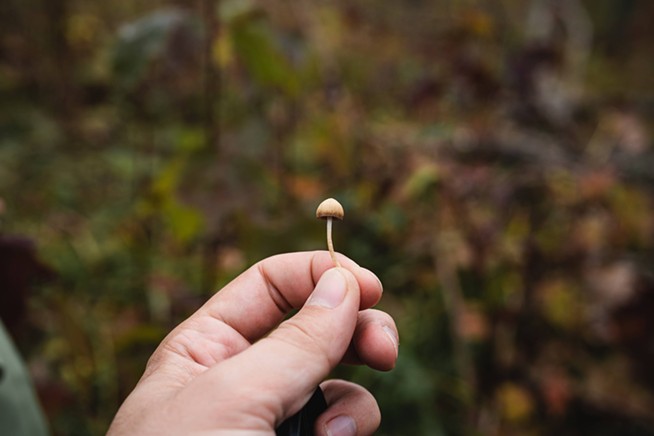
“It’s just the reality we’re in,” Toth told Unravel Halifax’s Philip Moscovitch in July. There are benefits to capital interest, he acknowledges: Outside investment can push laws forward that otherwise might stagnate for years. Serious corporate interest can bring legitimacy to research that might otherwise exist on the margins. And a pill with a standard, predictable dose holds obvious appeal over scarfing down a mushroom (or a handful of ’shrooms) and wondering, too late, if you should’ve only taken half the amount.
But there are drawbacks, too. Toth sees a danger in psychedelics becoming “overly commercialized” at the expense of consumers. At its worst, an influx of venture capital investment could open the door to further pharmaceutical greed: “People develop intellectual property and proprietary rights over particular substances, and there’s the ability to increase the cost. So that’s a concern.”
“There’s a lot of screening that has to be done”
One of the murkiest areas in psychedelic-assisted therapy is the matter of who’s qualified to provide treatment. Some argue that by running headlong into therapeutic alternatives, drug companies and wellness providers might overlook key safety precautions and increase the risk of a “bad trip”—or worse, leave patients with long-term trauma.
Earlier this year, Health Canada halted a clinical trial of MDMA-assisted psychotherapy in Toronto after deeming its sponsor hadn’t properly trained its staff, didn’t have the written informed consent of its clients and medical decisions weren’t properly supervised. (The trial was reinstated in September after the sponsor met Health Canada’s list of corrections.)
More than other medicines, psychedelics pluck at a point of tension between western medicine and Indigenous traditional practices. Psychedelic use in therapy, after all, is nothing new. In 2010, archaeologists in Bolivia found evidence dating ayahuasca use as far back as 1,000 years. Some researchers believe post-Paleolithic rock art in Spain could provide evidence of 6,000 years of psilocybin use.
According to mushroom expert Keith Williams, a part Mohawk and research fellow in integrative science at Cape Breton University, Indigenous knowledge of fungi is “far deeper and more nuanced” than often reported, including in North America. But for most of human history with psilocybin, ceremonies were led by shamans or curanderas—a world apart from a therapist’s office or a hospital bed.
Reconciling the two means asking difficult questions: How should psychedelics like psilocybin be supervised? And who gets to do the supervising?
“There’s no standard for training. It’s the Wild West.” - Erika Dyck, Canada Research Chair
tweet this
Few certificate programs exist in Canada for psychedelic-assisted therapy. Nova Scotia has none. What’s more, those programs that exist elsewhere can be hard for Maritimers to access. Several Nova Scotia health-care practitioners tried to take online training earlier this year, but told CBC News they couldn’t finish it without a Health Canada exemption. (The program involves consuming psilocybin, which requires special permission from Canada’s health regulator.)
Without a clear and Canada-wide credentialing process, psychedelic therapy has entered a vacuum.
“There’s no standard for training,” says Dyck, the Dal alum who’s a Canada research chair in the history of medicine at the University of Saskatchewan. “It’s the Wild West.”
Therapists without any clinical background at all are billing themselves as spiritual guides. Others are breaching patients’ trust: This past March, footage emerged of two BC therapists (one of whom was unlicensed) blindfolding and pinning down a PTSD patient in an MDMA-assisted clinical trial. That same therapist admitted to a sexual relationship with the patient after her sessions ended. (In an email to The Coast, the patient says she “profoundly object[s]” to the therapist’s framing of the events as a relationship, stressing that “any sexual contact between a client and therapist is abuse,” and moreover, “harmful, exploitative and unethical.” A sexual assault lawsuit was eventually settled out of court.)

Those concerns aren’t lost on Brenda Perks, the lead psychedelic-assisted therapist at Halucenex. A registered nurse for 35 years, she sees her role as making sure that clients are “safe, they’re comfortable, and that while they’re under the influence of the contents themselves, we are medically watching them.”
Each patient is screened for severe PTSD before starting the trial, as opposed to other mental health concerns, “because we have to really concentrate on the PTSD aspects.” Halucenex’s psychiatrists also screen patients for any cardiac issues (psilocybin increases your heart rate) and their overall health.
“We’re taking your vital signs constantly and making sure that they’re fine,” she tells The Coast.
She’s also careful not to overstep in her role as therapist—especially when dealing with a compound that can prompt deep, existential questions for her clients.
“I can’t tell you what something means,” Perks says. “I can only guide you and give you some basic understanding.”
Taking the magic out of the mushrooms?
If Fleming sees Nova Scotia as having the potential to be the “lead horse” in the psychedelic research race, Dyck is hoping that regulators might pump the brakes and choose their course with caution. Above all, she hopes Nova Scotia and Canada might “better reconcile” psychedelic research with Indigenous practices.
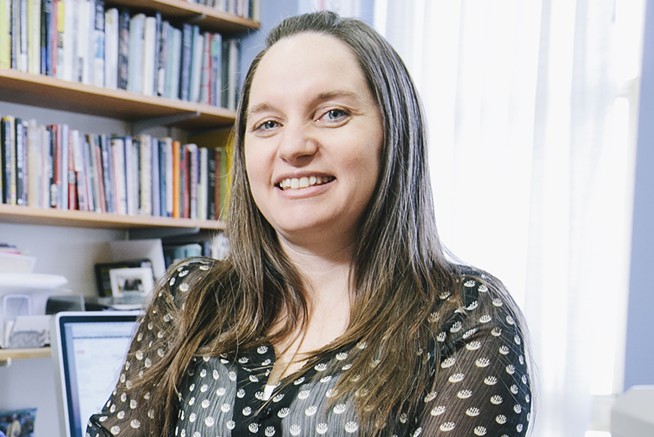
“There’s a long, long history—a millennia of history—of Indigenous uses of plants, and of non-Western uses of plants, but we tend not to think about that in this clinical context,” she tells The Coast. “I think that [history] is partly what's at stake in what feels right now like a kind of urgency to push psychedelics through a regulatory space to make them clinically available. And I think slowing down and taking stock of… these deeper questions, maybe even existential questions, would allow for a much more sustainable future with psychedelics, regardless of what their regulatory status ends up being.”
She worries that “just putting psychedelics into the pharmaceutical menu of options” may, in fact, “take the magic out” of the mushrooms.
“I would argue it doesn’t capture the kind of cultural significance that psychedelics might hold for rethinking how we evaluate risk, rethinking how we understand mental illness and distress,” Dyck says. “I think there’s more capacity here to think of psychedelics than to actually just regulate them.”

